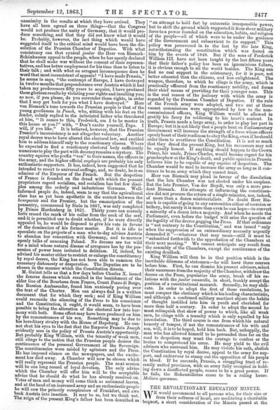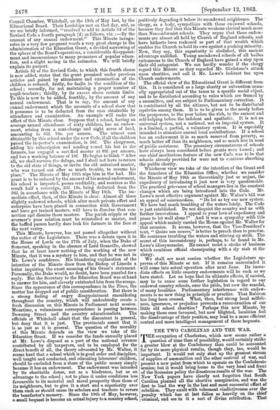THE REVOLUTIONARY EDUCATION MINUTE. IXTE would recommend to all persons
who, for their sins or 1' from their softness of heart, are meditating a charitable bequest, a short consideration of the Minute passed at the Council Chamber Whitehall, on the 19th of May last, by the Educational Board. Their Lordships met on that day, and, as we are briefly informed, "resolved to add to Article 52 of the Revised Code a fourth paragraph (d) as follows, viz. :—By the amount of any annual endowment." This Minute inaugu- rates in a very few pregnant words a very great change in the administration of the Education Grant, a decided narrowing of the sphere of the Board's operations, a considerable disappoint- ment and inconvenience to many promoters of popular educa- tion, and a slight saving in the estimates. We will briefly explain its purport. Article 52 of the Revised Code, to which this fourth clause is now added, states that the grant promised under previous articles and gained by attendance and examination of the children is reduced, firstly, for faults in the condition of the school ; secondly, for not maintaining a proper number of pupil-teachers; thirdly, by its excess above certain limits. To this is now to be added, fourthly, by the amount of any annual endowment. That is to say, the amount of any annual endowment which the accounts of a school show that it possesses is to be deducted from the snm obtainable by attendance and examination. An example will make the effect of this Minute clear. Suppose that a school, having an average annual attendance of sixty children, has an endow- ment, arising from a rent-charge and eight acres of land, amounting to 35/. 10s. per annum. The utmost sum obtainable by this school under the new Code, if all the children passed the inQpector's examination, is 36/. The clergyman, adding his subscription and sending 0. round his hat to the farmers, has engaged a certified master at 80/. per annum, and has a working balance of 10/. He begins to think "After all, we shall survive the deluge, and I shall not have to return to the old state of or invite the old untrained master, who was turned out after so much trouble, to resume his place." The Minute of May 19th nips him in the bud. His grant is to be reduced by the amount of his annual endowment, his school is inspected, passes creditably, and receives as the result half a sovereign, 35/. 10s. being deducted from the 36/. in accordance with the Minute of May 19th. The im- mediate effect, then, of this Minute is clear. Almost all those slightly endowed schools, which after much private effort and enterprise have been placed in connection with Government and have got trained masters, will have to dissolve that con- nection and dismiss those masters. The parish cripple or the overseer's poor relation must be reinstalled as master, and the baffled parson hardly dare look his farmers in the face at the next vestry. This Minute, however, has not passed altogether without the notice of the Legislature. There was a debate upon it in the House of Lords on the 27th of July, when the Duke of Somerset, speaking in the absence of Lord Granville' showed that he at least knew nothing of the working of the new Minute that it was a mystery to him, and that he was not in Mr. Lowe's confidence. His blundering explanation of the intention of the Minute drew from the Bishop of Lincoln a letter inquiring the exact meaning of his Grace's statement. Personally, the Duke would, no doubt, have been puzzled for a reply. But the Secretary to the Education Board was at hand to answer for him, and cleverly extricated him from the scrape. Since the appearance of this correspondence in the Times, the matter has dropped out of public consideration. But there is a strong feeling of angry disappointment smouldering throughout the country, which will undoubtedly create a fresh discussion on this Minute in Parliament next session. Meantime, a voluminous correspondence is passing between Downing Street and the country educationalists. The officials at Whitehall admit that the discontent is general, but deny that it is just. The provincials assert that it is as just as it is general. The question of the morality of this Minute depends on the view we take of the Education Grant. If we consider the funds annually placed at Mr. Lowe's disposal as a part of the national revenue contributed by all taxpayers, and to be employed for the direct benefit of all, the theory advocated by Mr. Walter, it seems hard that a school which is in good order and discipline, well taught and conducted, and educating labourers' children, should be excluded from a share of the public money simply because it has an endowment. The endowment was intended by its charitable donor, not as a hindrance, but as an advantage to the school ; not to place it under conditions less favourable to its material and moral prosperity than those of its neighbours, but to give it a start and a superiority over them such as should cause its scholars and teachers to revere the benefactor's memory. Since the 19th of May, however, a small bequest is become an actual injury to a country school, positively degrading it below its unendo wed neighbours. The - clergy, as a body, sympathize with these endowed schools, because they feel that this Minute weakens clerical much more than Nonconformist schools. They argue that these endow- ments are almost all held by Church of England schools, and have hitherto been reckoned as part of that wealth which enables the Church to hold its own against a pushing minority..
Now, they say, this superiority is abolished, this ancient advantage nullified. Young unendowed schools of all bodies extraneous to the Church of England have gained a step upon their old antagonist. We can hardly wonder if the dere regard this Minute as they regarded Mr. Gladstone's attack upon charities, and call it Mr. Lowe's indirect tax upon Church endowments.
The official view of the Educational Grant is different from this. It is considered as a large charity or subvention annu- ally appropriated out of the taxes to a specific social object, and to be distributed according to rules which are framed by a committee, and are subject to Parliamentary correction. It is contributed by all the citizens, but not to be distributed capitatim among them. It is to be given to the needy before the prosperous, to the poor before the rich, to the earnest and.
self-helping before the indolent and apathetic. It is not an universal system, not a national, not an imperial system. It is a limited, a partial, a voluntary system. It is especially intended to stimulate annual local contributions. If a school has an endowment it is so much removed from poverty, so much better off than its neighbours, and so much less in need of public assistance. The pecuniary circumstances of schools have always been considered before grants were issued ; and one chief meritorious feature of the new Code was to be that schools already provided for were not to continue absorbing the public charity.
Whichever view we take of the intention of the Grant and the functions of the Education Office, whether we consider the Minute of May 19th as theoretically just or unjust, the expediency of introducing it just now is very questionable.
The practical grievance of school managers lies in the constant changes which are being introduced into the Code. Mr.
Lowe's most effective argument against Mr. Walter's bill was an appeal ad misericordiam. "Do let us try our new system. We have had much troubling of the waters lately. The Code is just established. Do not disquiet the -country and us with farther innovations. I appeal to your love of expediency and peace to let well alone!" And it was a sympathy with this appeal which mainly carried the House against Mr. Walter for that occasion. It seems, however, that the Vice-President's text, " Qukta non movers," is better to preach than to practise.
He continues troubling the waters and stirring up strife. The secret of this inconsistency is, perhaps, to be found in Mr. Lowe's idiosyncracies. He cannot resist a stroke of business which combines official cheeseparing with a sly stab at the clergy.
We shall see next session whether the Legislature ap- proves of this Minute or not. If it remains unrescinded it will come into actual operation after next Tune. Its imme- diate effects on little country endowments will be such as we have stated. Let us hope that its ultimate effects, if carried, may be to cause some farther legislation in regard to our endowed country schools, once the pride, but now the scandal, of many localities. Parliamentary interference with endow- ments is no new thing in principle or practice. That ]iubicon has long been crossed. What, then, but strong local selfish- ness, ignorance, or prejudice prevents a reconstruction of our- little old school charities ? Perhaps this new Minute, by making these once favoured, but now blighted, localities feel the disadvantage of their position, may lead to a more efficient control and more intelligent management of these bequests.



































 Previous page
Previous page